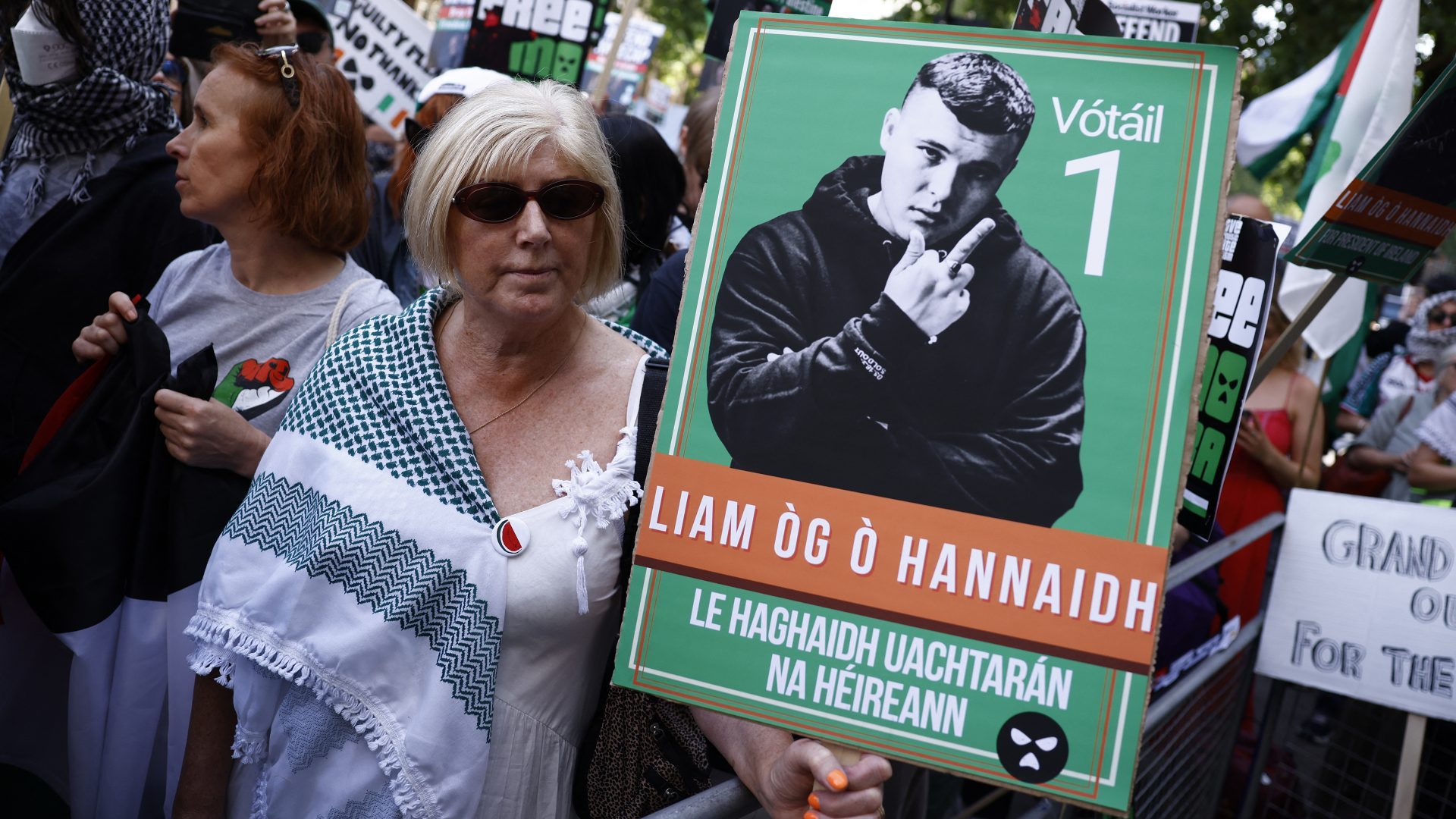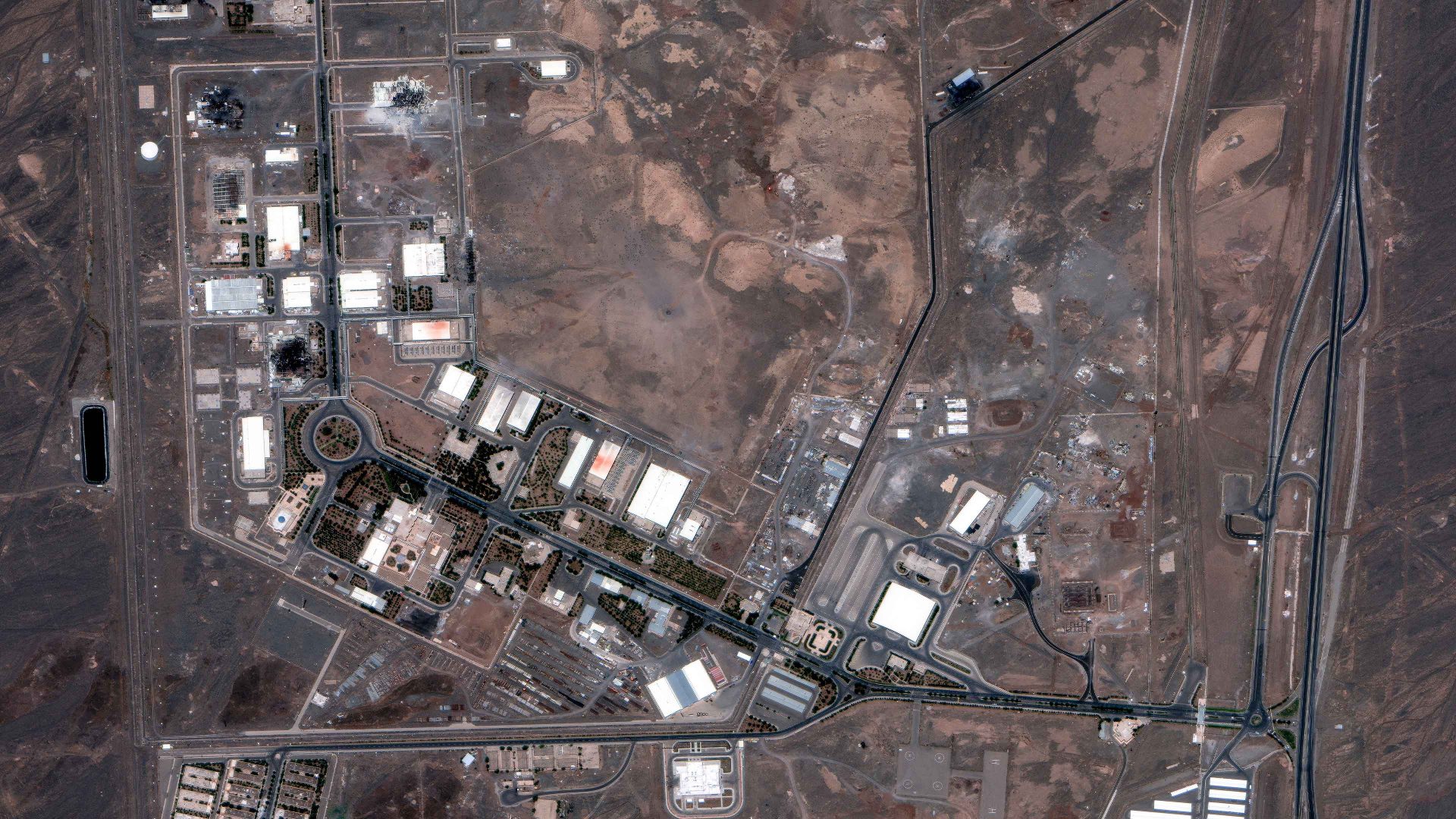I don’t know if Mo Chara will be late for his own funeral, but he was certainly late for his day in court. Pitching up on the Marylebone Road at a blush before 10am, the 27-year-old was running behind schedule even before he’d set foot inside Westminster Magistrates Court. For all it’s worth, I can’t help wondering if there were mitigating circumstances for this. As one third of Kneecap, the unashamedly hedonistic hip hop trio from West Belfast, perhaps young Mo didn’t realise there was such a thing as half past nine in the morning.
Last month, Chara, whose real name is Liam Óg Ó hAnnaidh, was charged with a terror offence after allegedly displaying a flag of the proscribed organisation Hezbollah at the band’s concert at the Kentish Town Forum, in November.
Accompanied by his bandmates Móglaí Bap and DJ Próvaí, after the hearing, to wild acclaim, Mo Chara addressed his supporters through a microphone. Wearing a keffiyeh and Ray Ban sunglasses, he said: “For anybody going to Glastonbury, you can see us there. Four o’clock on the Saturday [June 28th]. If you can’t be there, we’ll be on the BBC – if anybody watches the BBC. We’ll be at Wembley in September.”
The noise that accompanied his remarks was like a gig, but one being staged on a pavement in the thick of the mid-morning London rush-hour. I reckon there were about six or seven hundred people in attendance, a mixture of young and old, the gathering was multi-racial. I found myself asking the usual questions. First off, how can this many people be available for duty on a midweek morning? Secondly – and this became a matter of increasing importance as the hours ticket by – where are we all going to go to the toilet? In conditions that were becoming increasingly cramped, if not fully claustrophobic, I also wondered why the crowd wasn’t protesting against the true scourge of the modern age. Not the British State, not Israel, but backpacks.
In one sense, the gathering comprised people who our friends on the right might describe as “the usual suspects”. Representatives of the Socialist Workers’ Party and the Stop The War Coalition handed out placards while others proffered fringe publications, but in the sullen London heat, the Palestinian flags and Irish tricolours struggled to find a breeze upon which to fly. Intermittently, a chant rose from the crowd. “From the river to the sea, Palestine will be free,” people shouted. They even added a second couplet. “From the sea to the river, Palestine will live forever”. Written on brown cardboard, one homemade sign read, “Judaism, yes. Zionism, no”.
I spoke to one protestor, named Sadia, who told me the event reminded her of her years supporting Julian Assange. “I want to let [Mo Chara] know he has support, and that people are with him,” she said. In answer to my question of whether or not she was troubled by the presence of a Hezbollah flag at a rap gig, she replied, “It was in an environment of their own gig, in front of people who know the vibe and who know their music.”
But if the drivers inching their way towards Paddington might have deduced that the gathering was primarily concerned with Palestine, on the ground, I detected the presence of a different, though equally knotty, concern. All around me I could hear accents from Ireland, both north and south of the border. For those of a certain age, today’s proceedings were nothing new. As might be expected, the presence of an Irishman in an English court on charges related to terrorism does little to quieten the ghosts that are rarely quiet to begin with.
A few minutes later, Paul, from West Belfast, told me, “I’m from Divis Flats myself [on the Falls Road], which is shown a lot in [Kneecap’s] movie. I was brought up there in the seventies, the early eighties, and it was a war zone. It was a disaster zone. It was a concentration camp brought to Belfast by the British. They turned where I live into a concentration camp and that’s what I grew up with. So everything Kneecap stands for, I stand for as well. I stand against oppressive regimes: the Israeli Zionists and the British colonialists… I stand with Kneecap.”
Not everyone agreed. At about a quarter to ten, the timbre of a crowd that had been loud but hospitable suddenly turned mean. “There’s a guy there wrapped in an Israeli flag,” someone behind me said. Craning my neck, suddenly, I could see him. Youngish, not tall, wearing sunglasses. For a moment I wondered if things were about to turn physical. But the cops did move him, eventually. “Scum!” people shouted. “Get the fuck out of here!”
I questioned whether Kneecap themselves might have appreciated the sheer brass neck of this lone counterprotestor. After all, swimming against the tide is the band’s stock-in-trade. So successful have they been in turning modern rock and roll into something other than a house-trained commodity, in fact, that the British establishment has bestowed upon them its two highest compliments: legal trouble and a moral panic.
Time was, of course, that this kind of stuff used to happen more often. Melting in the sunshine on the Marylebone Road, I wondered if this was at all like the time, in 1967, when Mick Jagger and Keith Richards were sentenced to three months and one-year jail time respectively, following a drugs raid at Richards’s home. I wondered, too, if an editorial in The Times the following day, by William Rees-Mogg, serves us as well today as it did then. “Who breaks a butterfly on a wheel?” he asked.
And on the theme of there being nothing new under the sun, on a platform by the entrance to the court was a quartet of acoustic guitarists playing protest songs from what today seems like a simpler age. “How many times can some people exist before they’re allowed to be free?” they sang. Ordinarily, the answer would be blowing in the wind. But on this still and stifling day, instead, it hung heavy in the air.



